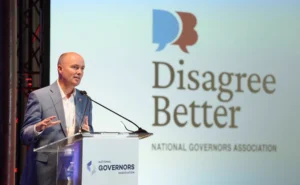
National Governors Association (NGA) Chair Utah Governor Spencer Cox welcomed Governors, national experts and students to Manchester, New Hampshire, September 12, for the first in a series of bipartisan events to help address toxic polarization in America – the aim of Governor Cox’s 2023-24 NGA Chair’s Initiative: Disagree Better.
The convening focused on the theme of “Correcting Misperceptions and Highlighting Commonalities,” and the event began with two panel discussions featuring speakers of differing political and professional backgrounds who provided stories, data and examples revealing how Americans want to improve political discourse in the country and can work to find common ground and learn to disagree in more thoughtful, productive ways when interacting with relatives, friends, neighbors, colleagues as well as people they’ve never met in person.
Journalist Amanda Ripley moderated the first panel discussion that featured a “A Case Study in Good Conflict.” The panelists included:
- Martha Ackelsberg with the Congregation B’nai Jeshurun
- Caleb Follett with the Michigan Corrections Organization SEIU Local 526M
- Rabbi Shuli Passow with the Congregation B’nai Jeshurun
- Andy Potter with One Voice United
The panelists recounted their work to develop deeper understanding about people with different political beliefs by embarking on a three-day home study exchange. The exchange occurred in 2018 and involved a cohort of liberal leaning New Yorkers spending three days in Michigan, and a group of conservative leaning Michiganders spending three days in New York.
The participants recounted some humorous anecdotes – experiences one could almost see pulled from a comedy sketch or coming directly from well-known stories like the Aesop’s Fables “The Town Mouse and the Country Mouse.” And while more lighthearted experiences like dining at a Kosher vegan Chinese restaurant in New York and trying Superman ice cream in Michigan brought levity to some of the new cultural experiences the participants engaged in during the program, the panelists shared that they also discovered new ways of thinking and communicating while, ultimately, experiencing profound, lasting shifts that have positively changed the way they engage with all people, especially when discussing political differences, including when speaking about some of the most polarizing policy topics, such as immigration and the Second Amendment.
Through the exchange program, the panelists found asking thoughtful questions, challenging personal assumptions and engaging in meaningful dialogue served as key tools for helping check preconceived ideas and developing better understanding for others’ beliefs. The group also found value in forging personal relationships. As they got to know people, forgoing generalizations in favor of personal conversations, they started to develop a more nuanced understanding about why people held beliefs that differed from their own.
The group recommends Americans develop guardrails to help foster thoughtful dialogue. The group shared the three rules they’ve used, noting the rules can be tweaked:
1. Take seriously the things others hold dear.
2. Do not try to convince each other that someone is wrong.
3. Be curious.
The second panel built on the first panel’s case study by sharing examples of recent research studies showing the majority of Americans want to have more meaningful conversations and less political discord. Ryan Stowers with the Charles Koch Foundation, moderated the second panel, titled “Correcting the Perception Gap,” featuring the panelists:
- Kate Carney with More in Common
- Sean Westwood with the Dartmouth Polarization Lab
- Deke Copenhaver with Starts with Us
Kate Carney shared details about work More in Common is doing to study the “exhausted majority,” noting most Americans believe “we can find common ground. They’re exhausted by our polarization, and I think most strikingly, they’re not equally or proportionally represented in our public discourse.” Moreover, the research shows that only about 14% of Americans comprise the most politically polarized citizens, and yet “these are often … the views that we see when we turn to the media, when we turn to social media … But if that is the only place where you’re getting the perception of the other side, then it’s actually not representative for really showing this exhausted majority.”
Deke Copenhaver shared information about a recent study conducted with George Washington University before the midterm elections. The study revealed “there actually are people working in bipartisan fashion, but the extremes on either end get four times the coverage that the people working to do the work of the people get.”
The group also stressed that elected officials have a role to help improve the way the country engages in political and policy conversations. Sean Westwood said, “When it comes to politics, our elected officials define what is or is not acceptable.” Moreover, Westwood noted, “the data clearly show that if you want to persuade voters, negative campaigns aren’t very effective. They have very small effects on turnout; very, very small effects to the point that they’re unobservable for anything other than campaigns for the Presidency.”
As with the first panel, the second panel emphasized that Americans desire more unity and more meaningful dialogue. The panelists’ research indicates Americans want to disagree better despite current obstacles, including the perception that Americans want more bickering and division.












